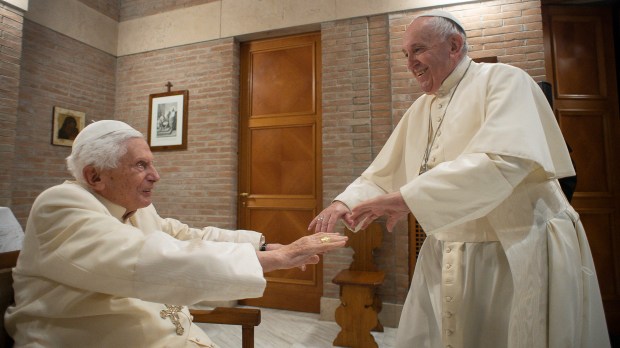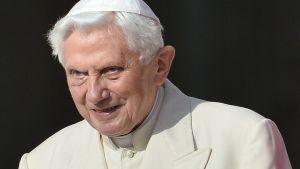Pope Francis agrees with his immediate predecessor, Benedict XVI, that the future of the Church will be “smaller,” more “humble and authentic,” with “energy for the essential.”
This came to light when Pope Francis was asked about the changing situation of the Church in a recent dialogue with fellow religious.
As has become customary on the Pope’s international trips, earlier this month in Malta, the Holy Father had an informal meeting with local members of his own religious family, the Society of Jesus, or the Jesuits.
A transcription of this informal conversation of about 40 minutes, held on the morning of Sunday, April 3, 2022, at the Apostolic Nunciature in the presence of 38 Maltese religious, was posted online by La Civiltà Cattolica, the Italian Jesuit magazine, before its publication in paper format on April 16.
Where is the Church going?
The Pope was asked what the future of the Church will be like, as it becomes smaller in secular Europe, while it develops quickly in Asia and Africa. “Where is it going,” he was asked.
To answer the question, the Pope stated immediately that “Pope Benedict was a prophet of this Church of the future, a Church that will become smaller, lose many privileges, be more humble and authentic, and find energy for the essential. It will be a Church that is more spiritual, poorer, and less political: a Church of the little ones. As a bishop, Benedict had said: Let us prepare ourselves to be a smaller Church.”
Pope Francis went so far as to say that this is one of Benedict XVI’s “richest intuitions.”
The Holy Father acknowledged the problem of a lack of vocations for many religious orders, linking it to the fact that there are simply fewer young people, as families have perhaps only one child. “Marriages are decreasing, while people think about growing in their profession,” he added.
Respect in vocational issues
Such a situation also brings the risk of “wanting to seek vocations without adequate discernment,” a danger that the Pope has warned about on other occasions.
I remember that a Synod on consecrated life was held in 1994. I came as a delegate from Argentina. At the time, the scandal of novices in the Philippines had broken out: the religious congregations went there in search of vocations to “import” into Europe. This is terrible.
The Pope has brought attention to this issue before, for example in the post-synodal apostolic exhortation after the synod on the Amazon. There he pointed out: “It is noteworthy that, in some countries of the Amazon Basin, more missionaries go to Europe or the United States than remain to assist their own Vicariates in the Amazon region.”
“Europe has aged. We have to get used to this, but we have to do it creatively, so as to take for vocations the qualities that you mentioned in general for the Church in your question: humility, service, authenticity,” the Pope told the Jesuits.
We’ve moved forward and there’s no going back
He also addressed the questioner’s query about the synodal journey of the Church.
Then you also mentioned the synodal journey. And this is a further step. We are learning to speak and write “in Synod.” It was Paul VI who resumed the synodal discourse, which had been lost. Since then we have moved forward in understanding, in understanding what the Synod is. I remember that in 2001 I was the relator for the Synod of Bishops. Actually, the relator was Cardinal Egan, but because of the tragedy of the Twin Towers, he had to go back to New York, his diocese. I was the substitute. The opinions of everyone, even of individual groups, were collected and sent to the General Secretariat. I would gather the material and arrange it. The secretary of the Synod would examine it and say to remove this or that thing that had been approved by a vote of the various groups. There were things that he did not consider appropriate. There was, in short, a pre-selection of materials. Clearly there was no understanding of what a Synod is.
Today we have moved forward and there is no going back. At the end of the last Synod, in the survey of topics to be addressed in the next one, the first two were priesthood and synodality. It seemed clear to me that they wanted to reflect on the theology of synodality in order to take a decisive step toward a synodal Church.
The real problem is not if we are few
Then, the Pope returned again to a vision of the Church.
Finally, I want to say that we must not forget that jewel that is Paul VI’s Evangelii Nuntiandi. What is the vocation of the Church? It is not numbers. It is to evangelize. The joy of the Church is to evangelize. The real problem is not if we are few, in other words, but if the Church evangelizes. In the meetings before the Conclave, they talked about the profile of the new pope. It was precisely there, in the General Congregations, that the image of a Church that goes out was used. In Revelation it says, “I stand at the door and knock.” But today the Lord is knocking from within so that we may let him go out. This is the need of today, the vocation of the Church today.


